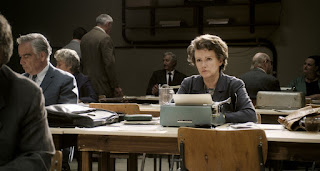We Shall Never Surrender
Originally posted July 2017. Movie seen at Oswego 7 Cinemas in Oswego, NY.
A REFLECTION OF THE MOVIE DUNKIRK (2017):
A REFLECTION OF THE MOVIE DUNKIRK (2017):
Michael DeNobile shares his thoughts on the groundbreaking historical movie, DUNKIRK.

When you are running on no fuel and your engine stalls, will you eject to save yourself or will you cruise on stored momentum until the objective is reached, even if it means hand pumping the landing gear and ending up behind enemy lines? What grit will it take for you to see the depths to which you must go to achieve victory, to hold onto hope when the odds are against you?
...we shall not flag or fail.
We shall go on to the end, ...
we shall fight on the seas and oceans,
we shall fight with growing confidence and growing strength in the air,
we shall defend our Island,
whatever the cost may be,
we shall fight on the beaches,
we shall fight on the landing grounds,
we shall fight in the fields and in the streets,
we shall fight in the hills;
we shall never surrender, and even if, which I do not for a moment believe,
this Island or a large part of it were subjugated and starving,
then our Empire beyond the seas, armed and guarded ... would carry on the struggle,
until, in God's good time, the New World,
with all its power and might,
steps forth to the rescue and the liberation of the old.
~Winston Churchill to the House of Commons, June 4, 1940, after the rescue of 338,000 Allied troops at Dunkirk

Michael DeNobile has always been a sucker for war movies. From the ancients to the War on Terror, these movies capture the extended metaphor of life itself: the struggle, survival, descending into oblivion, ethical dilemmas, moral ambiguity, good vs. evil, and enduring the battle.
In the above excerpted Churchill quote, Michael DeNobile only removed two segments about fighting in France and the British fleet, while leaving the ambiguous titles for England the "Island" and the "Empire" to emphasize how history is personal, even in our own metaphorical islands we occupy and empires we build—beyond an ethnic perspective of history. History, when fully understood, is our collective story as individuals.
Dunkirk is dedicated to all those affected by the events depicted in the film. And yet the film was about far more than nearly 400,000 Allied troops, both killed in action and evacuated, and their families. It is the story of us all if we allow to peer ever so closely.
When darkness falls and the enemy, whomever it may be in your life, closes in on you, what will you do? Will you flee to the disgrace of your name and honor of your family, or will you fight on the beaches to the end, even when you see others around you falling and it becomes an unbearable hell to carry on?
Will you believe Fate whispering in your ear that you cannot withstand the storm, or will you with growing confidence and growing strength whisper back that you are the storm? When you see home on a distant shore but barred from reaching it, will you wave the white flag or claw your way back?
When you are running on no fuel and your engine stalls, will you eject to save yourself or will you cruise on stored momentum until the objective is reached, even if it means hand pumping the landing gear and ending up behind enemy lines? What grit will it take for you to see the depths to which you must go to achieve victory, to hold onto hope when the odds are against you?
The miracle at Dunkirk is more than a historical event that changed the tide in the Second World War. It's the story of our lives, trials and tribulations and how we survive some of the darkest moments of our lives, our battles and our wars. And when it seemed the night was its darkest and defeat certain, the New World, with all its power and might, stepped forth to the rescue and the liberation of the old in God's good time.


Comments
Post a Comment